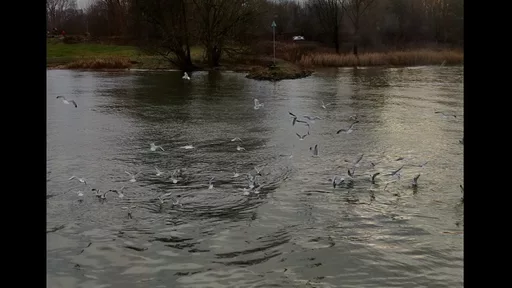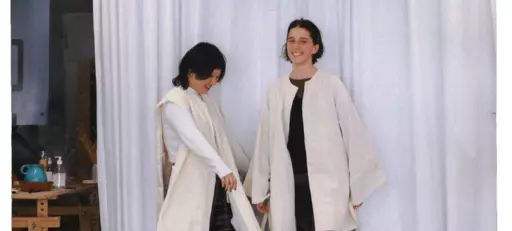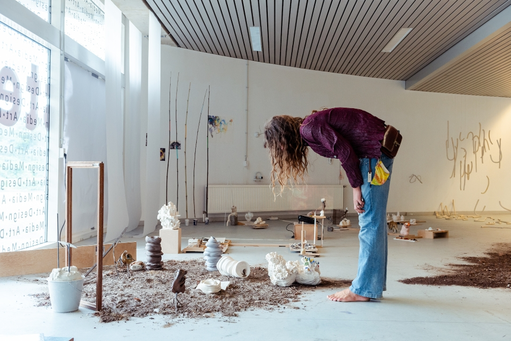
Ruimte voor makers, ruimte voor onderzoek
Interview met Joke Alkema (ArtEZ Studium Generale) en Minke Vos (ArtEZ Press), initiatiefnemers van APRIA
interviewtopic: Research in and through the arts
Joke Alkema (hoofd ArtEZ Studium Generale) en Minke Vos (hoofd ArtEZ Press), zijn initiatiefnemers van APRIA (ArtEZ Platform for Research Interventions of the Arts) dat in 2019 werd gelanceerd. Ze spraken met Robin Kramer namens de communicatieafdeling van ArtEZ over het platform en over artistiek onderzoek. Het interview is hieronder te lezen én op de ArtEZ-website.
For English, see below
Aan een kunstwerk gaat onderzoek vooraf: het materiaal, het verhaal, de context, de vorm. Maar soms is het onderzoekende proces ook al een vorm van kunst, of is het kunstwerk zelf een vorm van onderzoek. Een van de termen voor deze overlap van kunst en onderzoek heet ‘artistiek onderzoek’ en kent veel vormen. Om al die vormen, uitingen en opvattingen van artistiek onderzoek een plek te geven, heeft ArtEZ een digitaal platform speciaal opgezet voor en over artistiek onderzoek: APRIA. De grondleggers van dit prikkelende platform blikken terug én vooruit, naar de opkomst en de toekomst van artistiek onderzoek.
Aan een kunstwerk gaat onderzoek vooraf: het materiaal, het verhaal, de context, de vorm. Maar soms is het onderzoekende proces ook al een vorm van kunst, of is het kunstwerk zelf een vorm van onderzoek. Een van de termen voor deze overlap van kunst en onderzoek heet ‘artistiek onderzoek’ en kent veel vormen. Om al die vormen, uitingen en opvattingen van artistiek onderzoek een plek te geven, heeft ArtEZ een digitaal platform speciaal opgezet voor en over artistiek onderzoek: APRIA. De grondleggers van dit prikkelende platform blikken terug én vooruit, naar de opkomst en de toekomst van artistiek onderzoek.

APRIA (ArtEZ Platform for Research Interventions of the Arts) is een breed, peer-reviewed online platform voor artistiek onderzoek, opgezet in een samenwerking tussen ArtEZ Press en ArtEZ Studium Generale. De breedte van het multidisciplinaire platform is terug te zien in de verschillende vormen van de bijdragen zelf, maar ook in wie de bijdragen maken — studenten, lectoren en artistiek onderzoekers van binnen én buiten ArtEZ. Minke Vos, uitgever van ArtEZ Press en mede-oprichter van APRIA: “Het onderzoek kan op allerlei manieren gepresenteerd worden: een tekst, een video, een podcast. Alle makers en vormen van onderzoek zijn welkom.”
Traditioneel en experimenteel
“We zijn de ontwikkeling van het platform in 2017 begonnen door aan studenten, docenten, hoofden en directeuren van ArtEZ de vraag te stellen: is er behoefte aan een mogelijkheid om artistiek onderzoek te delen? En zou een dergelijk platform voor artistiek onderzoek daarvoor een vorm kunnen zijn? Die behoefte bleek duidelijk aanwezig,” aldus Joke Alkema, hoofd van ArtEZ Studium Generale en de andere mede-oprichter van APRIA. "We wilden ook laten zien dat artistiek onderzoek een heleboel vormen aan kan nemen.” Er is niet één definitie van wat artistiek onderzoek is. “Elke maker werkt vanuit een onderzoeksproces, of dat nu traditioneel is of experimenteel. Daarom is APRIA opgericht, om die reikwijdte te laten zien. Om zichtbaar te maken dat iedereen onderzoek kan doen: van bachelor en master tot lector.” Minke voegt toe: ” En bovendien via alle disciplines die ArtEZ rijk is.”
Het onderzoek kan op allerlei manieren gepresenteerd worden: een tekst, een video, een podcast. Alle makers en vormen van onderzoek zijn welkom.
Maatschappelijke urgentie
APRIA publiceert bijdragen over urgente vraagstukken van deze tijd. Minke: “Wat we met APRIA willen uitstralen is dat iedereen via artistiek onderzoek een waardevolle bijdrage kan leveren aan de toekomst.” Dit uitgangspunt sluit ook aan bij het instellingsplan van ArtEZ waarin één van de doelen is om studenten op te leiden die midden in de maatschappij staan. “Daarom vinden we het belangrijk dat je als student ook in aanraking komt met verschillende perspectieven op de vragen van deze tijd en hoe je daar mee om kunt gaan,” vertelt Joke. “Daar kiezen we bij APRIA wel een bepaalde kleur in, ik geloof ook niet in neutraal onderwijs,” legt ze uit.

Open Call
Studenten, docenten en onderzoekers van ArtEZ, maar ook kunstenaars en onderzoekers van buiten de muren van ArtEZ, krijgen via Open Calls de mogelijkheid om artistiek onderzoek te presenteren. De board bestaat uit vertegenwoordigers (docenten en studenten) uit het bachelor en masteronderwijs van ArtEZ, afkomstig van verschillende steden en disciplines. De board leest, bekijkt of beluistert de inzendingen en toetst ze vervolgens aan de hand van vooraf opgesteld criteria. Joke: “Dat gaat dan over toegankelijkheid, urgentie, over hoe het onderzoek is opgebouwd en onderbouwd, maar de board houdt ook altijd de visie van APRIA in het achterhoofd.
"Als het artikel volgens de board te eenzijdig is opgesteld en geen ruimte biedt aan verschillende perspectieven, wordt dat artikel eruit gefilterd,” legt Joke uit De board kiest unaniem voor of tegen publicatie. “Bij de uitgaves van APRIA Journal, het magazine van APRIA dat ook op het online platform wordt gepubliceerd, gebeurt hetzelfde," vult Minke aan. "Kwaliteit beoordelen, rijmen met het APRIA statement en de APRIA uitgangspunten. Soms is dat best ingewikkeld. We krijgen straks een journal-issue over performance en geluid — hoe peer review je zoiets?”
"Als het artikel volgens de board te eenzijdig is opgesteld en geen ruimte biedt aan verschillende perspectieven, wordt dat artikel eruit gefilterd,” legt Joke uit De board kiest unaniem voor of tegen publicatie. “Bij de uitgaves van APRIA Journal, het magazine van APRIA dat ook op het online platform wordt gepubliceerd, gebeurt hetzelfde," vult Minke aan. "Kwaliteit beoordelen, rijmen met het APRIA statement en de APRIA uitgangspunten. Soms is dat best ingewikkeld. We krijgen straks een journal-issue over performance en geluid — hoe peer review je zoiets?”
Daarom vinden we het belangrijk dat je als student ook in aanraking komt met verschillende perspectieven op de vragen van deze tijd en hoe je daar mee om kunt gaan.
De toekomst
Nog meer samenwerken, nog meer mogelijkheden voor studenten om van elkaar te leren — dat is de toekomst van APRIA. “We hebben net een event gehad in een samenwerkingsproject met het lectoraat Theorie in de Kunsten, de mediatheek van ArtEZ, Studium Generale, Press en APRIA, dat Doing (Artistic) Research heet,” vertelt Joke. “Daarin vertelde Martine van Lubeek, die net is afgestudeerd bij BEAR Fine Art, over hoe zij haar afstudeeronderzoek heeft aangepakt Achteraf hoor je dan hoe fijn studenten het vinden om zoiets mee te krijgen.” De events maken onderzoek doen wat laagdrempeliger. “Er is zoveel talent, als je die drempel verlaagt dan gaat potentieel onderzoek ook niet verloren.”
“Het is goed om te zien dat het belang van artistiek onderzoek in al zijn diversiteit ook vanuit het perspectief van de wetenschappelijke wereld als belangrijk wordt ervaren,” zegt Minke. Joke vult aan: “Maar we blijven een kunstacademie. Het gaat om de makers. Als de maker tegen het traditionele, wetenschappelijke beeld van onderzoek in wil gaan, dan moet die mogelijkheid er zijn. Verschillende soorten van onderzoek samen laten zien, werkt juist heel inspirerend.”
“Het is goed om te zien dat het belang van artistiek onderzoek in al zijn diversiteit ook vanuit het perspectief van de wetenschappelijke wereld als belangrijk wordt ervaren,” zegt Minke. Joke vult aan: “Maar we blijven een kunstacademie. Het gaat om de makers. Als de maker tegen het traditionele, wetenschappelijke beeld van onderzoek in wil gaan, dan moet die mogelijkheid er zijn. Verschillende soorten van onderzoek samen laten zien, werkt juist heel inspirerend.”
Ook bijdragen?
Dat kan. Momenteel staat er een Open Call open bij APRIA over uitputting. De ene na de andere crisis vliegen ons om de oren: we zijn op. Hoe kunnen we potentie vinden in tijden van uitputting en vermoeidheid? Je hebt nog tot 19 januari om je bijdrage in te zenden.
Ga naar Open Call
Volg APRIA, Studium Generale and ArtEZ Press op de website, instagram en LinkedIn
Website van Apria
Website (en webshop!) van ArtEZ Press
Ga naar Open Call
Volg APRIA, Studium Generale and ArtEZ Press op de website, instagram en LinkedIn
Website van Apria
Website (en webshop!) van ArtEZ Press
Room for research, room for artists
An artwork is often preceded by research: the material, the story, the context, the form. But sometimes the investigative process is already a form of art, or the artwork itself is a form of research. One of the terms given to the overlap of art and research is 'artistic research' and knows many forms. To show the scope of all the forms, expressions and views of artistic research, ArtEZ has set up a digital platform especially for and about artistic research: APRIA. The founders of this stimulating platform look back and forward, to the rise and future of artistic research.

APRIA (ArtEZ Platform for Research Interventions of the Arts) is a peer-reviewed online platform for artistic research, set up in collaboration between ArtEZ Press and Studium Generale. The wide range of the multidisciplinary platform is reflected in the possibilities of the contributions, which show many forms of artistic research, as well as the contributors themselves — students, but also lecturers and artistic researchers from within and outside of ArtEZ. Minke Vos, editor of ArtEZ Press and co-founder of APRIA: “The research can be presented in all kinds of ways: a text, a video, a podcast. All contributors and forms of contribution are welcome.”
Both traditional and experimental
“We started developing the platform in 2017 by asking students, teachers, heads and directors of ArtEZ: is there a need for sharing artistic research? And could an online platform be the conduit for such a thing? The need was clearly present,” says Joke Alkema, head of Studium Generale and co-founder of APRIA.
"We also wanted to show that artistic research can take on many forms,” Joke continues. There is no single definition for artistic research. “Every artist goes through a research process, be it traditional or experimental. That’s why APRIA was founded, to show that scope. To communicate that everyone can do research: from bachelor and master to lecturer.” Minke adds: “Research comes in many forms, through all the disciplines that are taught at ArtEZ.”
"We also wanted to show that artistic research can take on many forms,” Joke continues. There is no single definition for artistic research. “Every artist goes through a research process, be it traditional or experimental. That’s why APRIA was founded, to show that scope. To communicate that everyone can do research: from bachelor and master to lecturer.” Minke adds: “Research comes in many forms, through all the disciplines that are taught at ArtEZ.”
The research can be presented in all kinds of ways: a text, a video, a podcast. All contributors and forms of contribution are welcome.”
Social urgency
APRIA publishes contributions relating to the urgent issues of our time. Minke: “Everyone can make a valuable contribution to the future through artistic research. That’s what APRIA wants to convey.” This principle is also in line with ArtEZ’s institutional plan, in which one of the goals is to train students who are at the heart of society. “At the end of the day ArtEZ is an educational institute, of course,” says Joke. “That’s why it’s important for students to come into contact with different perspectives on the specific questions of our time and how to deal with them. I also do not believe in neutral education,” Joke explains.

Open Call
Students, as well as teachers and researchers from ArtEZ, and artists and researchers from outside the Netherlands, are given an opportunity to present artistic research through Open Calls. The board consists of representatives (lecturers and students) from ArtEZ's Bachelor's and Master's education, from different cities and disciplines. The board reads, views or listens to the submissions and tests them against the requirements of the predefined criteria.
Joke: “Think: accessibility, urgency, how research is structured and substantiated. The board also always keeps APRIA’s statement in mind. If, according to the board, the article is too one-sided and offers little room for different perspectives, the article in question will be filtered out.” The board unanimously opts for or against publication. “The same thing goes for the releases of APRIA Journal, APRIA's magazine that is also published on the online platform," Minke adds. "The board assesses quality, reconciles it with the APRIA statement and the principles of APRIA. Which can be quite complicated. We are working on a journal issue about performance and sound — how do you peer review something like that?”
Joke: “Think: accessibility, urgency, how research is structured and substantiated. The board also always keeps APRIA’s statement in mind. If, according to the board, the article is too one-sided and offers little room for different perspectives, the article in question will be filtered out.” The board unanimously opts for or against publication. “The same thing goes for the releases of APRIA Journal, APRIA's magazine that is also published on the online platform," Minke adds. "The board assesses quality, reconciles it with the APRIA statement and the principles of APRIA. Which can be quite complicated. We are working on a journal issue about performance and sound — how do you peer review something like that?”
That’s why it’s important for students to come into contact with different perspectives on the specific questions of our time and how to deal with them.
What the future holds
More collaboration, more opportunities for students to learn from each other — that’s the future of APRIA. “We just had an event in a collaborative project with the theory research group, the media library, Studium Generale, ArtEZ Press and APRIA called Doing (Artistic) Research,” says Joke. “In it, Martine van Lubeek, who just graduated from BEAR Fine Art, shared how she approached her graduation research. Afterwards students told us how valuable it had been to them.” Events like these make research more accessible to students. “There is so much talent, if you lower the threshold for students, then potential research will not be lost.”
“The scientific world is discovering the importance of diverse artistic research, which is a good development,” says Minke. Joke agrees: “However, we remain an university of the arts. The creators are what matters. If an artist wants to go against the traditional, scientific approach to research, they should be allowed to do so. Showcasing different types of research together is actually very inspiring.”
“The scientific world is discovering the importance of diverse artistic research, which is a good development,” says Minke. Joke agrees: “However, we remain an university of the arts. The creators are what matters. If an artist wants to go against the traditional, scientific approach to research, they should be allowed to do so. Showcasing different types of research together is actually very inspiring.”
Also contribute to APRIA?
You can. There is currently an Open Call open at APRIA on exhaustion. We are living in a time of continuous crises. How can we find potential in times of exhaustion and fatigue? You still have until 19 January to submit your contribution.
Go to Open Call
Follow APRIA, Studium Generale, ArtEZ Press on the website, instagram, LinkedIn
Website Apria
Website (and webshop!) of ArtEZ Press
Go to Open Call
Follow APRIA, Studium Generale, ArtEZ Press on the website, instagram, LinkedIn
Website Apria
Website (and webshop!) of ArtEZ Press